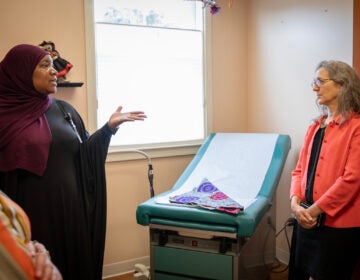Adults with intellectual disabilities may wait years for services. Shapiro’s budget would help
A 2022 report from Pennsylvania’s Department of Human Services found that the median amount of time that people spend on all waiver waitlists for these services is 2.6 years.

Gov. Josh Shapiro speaks with somene at a BARC Developmental Services event centering on his proposed investments in the 2024-25 budget to support Pennsylvanians with intellectual disabilities and autism. (Commonwealth Media Services)
This story originally appeared on Spotlight PA.
Tristan Rovito finally moved out of his mother’s house this month. The 25-year-old had wanted to leave since at least 2019, and his mother, Becky Bowling of Carlisle, had been trying to make that happen for a while.
But for Rovito, flying the nest was not as simple as finding an apartment and a couple of roommates. He has autism and low vision, which limit his social and communication skills, and his ability to care for himself.
Before the move, Bowling had been his caregiver around the clock, but the work was difficult and required her to quit her job. The situation was not sustainable, she told How We Care, which is why she needed her son to live on his own in a group home.
“I feel like my mom needs to have a lot of breaks from me,” said Rovito, who admits he was also itching for a change.
Both of them are thrilled that Rovito now lives in a group home, the entire cost of which is covered by a waiver from Pennsylvania’s Medicaid Home and Community-Based Services program.
A group home is a supervised residence for adults with autism and intellectual disabilities. It’s staffed by direct support professionals who assist Rovito and his two roommates with tasks like light housework, personal hygiene, and meal preparation.
“It’s going good,” said Rovito, who reports that his new roommates are nice and that he looks forward to spending more time with his girlfriend.
It took a long wait for him to get these services, a common experience in Pennsylvania.
Because the level of need exceeds what’s appropriated in the state budget, adults with autism and intellectual disabilities in the commonwealth spend months, if not years, waiting for waivers that pay for services, to which they’re entitled as Medicaid beneficiaries. April data from the Pennsylvania Department of Human Services show nearly 13,000 adults are on waitlists to receive these services. A 2022 report from DHS found that the median amount of time that people spend on all waiver waitlists is 2.6 years.
Once Rovito got the approval to be added to a waiver waitlist, it took nine months for a group home spot to open up. He describes these months of limbo as a “nightmare.”
“That period of time was really hard on both of us,” seconded Bowling. During the nine-month wait, she said they wondered “‘You know, is it going to happen?’”
Democratic Gov. Josh Shapiro’s budget proposal includes $78 million that would allow the Office of Developmental Programs to increase the number of waiver slots by 1,500 so that people like Rovito don’t need to wait so long for spots at group homes, as well as other services. The waiver program gives families access to a range of services, including various therapies, shift nursing, job counseling, respite for caregivers, and assistance with daily living tasks such as personal hygiene, transportation, and budgeting.
Legislative leaders, including Democrats who control the state House and Republicans who run the state Senate, are currently negotiating what the final budget deal will look like ahead of the June 30 deadline.
“The governor put a lot on the table with his budget proposal. While accommodating all his requests is not feasible, this is an area I certainly feel a need to address to the best of our ability,” said state Senate Majority Leader Joe Pittman (R., Indiana) in an emailed statement.
Sherri Landis — executive director of the Arc of Pennsylvania, which advocates for Pennsylvanians with intellectual and developmental disabilities, and their families — called Shapiro’s proposal “historical.”
“I couldn’t even begin to tell you when a governor has really taken on the waiting lists in the magnitude that Gov. Shapiro has,” she said.
However, even people who have waivers struggle to access services, which are provided by community-based nonprofits and companies. Providers say that employee recruitment and retention has long been an issue for the direct support professional [DSP] industry, where entry-level wages are notoriously low.
That’s why in addition to the $78 million to expand the number of available waivers, Shapiro l wants lawmakers to allocate another $483 million in state and federal money, or a 12% rate increase, to direct service providers, which they in turn can spend on pay bumps, retention bonuses, recruitment, and other costs related to staffing. The last time direct service agencies got a rate bump was January 2022.
“Access to services is not possible without supporting the providers and DSPs who provide services, and this investment in rates will support … DSPs across this field,” a DHS spokesperson told Spotlight PA in an emailed statement.
While providers would not be mandated to use Shapiro’s proposed infusion of tax dollars to increase pay, DHS says that previous rate increases have bolstered staff salaries.
Landis is confident that wages will increase if Shapiro’s budget is approved, and that doing otherwise would be “incomprehensible.” She said many providers tell her they struggle to keep their doors open due to an inability to retain workers.
“They need to compete with the Sheetz and the service industry, and the warehouses,” she said.
Stephen Suroviec — president and chief executive officer of Achieva, a Pittsburgh-based waiver services provider that’s affiliated with the Arc of Pennsylvania — told Spotlight PA via email that direct support professionals have cited low pay as the reason they’ve resigned from the nonprofit, which has a starting hourly wage of $15.76.
“While we haven’t directly reduced the employment services we offer, due to staffing shortages there is often a significant delay between the time a person has services authorized and (is ready to receive them) and when we can provide them,” said Suroviec. “This delay is regrettable and highlights the ongoing challenges finding staff.”
Bowling worries about her son’s quality of life as she ages. It’s unlikely that Rovito will live in this particular group home for the rest of his life, and inevitably other issues will come up that will necessitate Medicaid-funded support. At 65, she’s aware that one day she won’t be able to advocate for her son.
Or, as Rovito puts it, “She’s getting too old to do this.”

Get daily updates from WHYY News!
WHYY is your source for fact-based, in-depth journalism and information. As a nonprofit organization, we rely on financial support from readers like you. Please give today.





